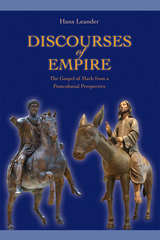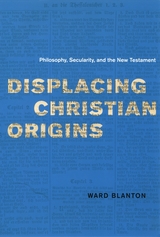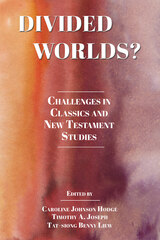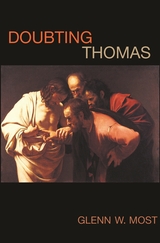4 start with D start with D


Displacing Christian Origins traces the current critical engagement of Agamben, Derrida, and Žižek, among others, back into nineteenth- and early-twentieth-century philosophers of early Christianity. By comparing these crucial moments in the modern history of philosophy with exemplars of modern biblical scholarship—David Friedrich Strauss, Adolf Deissmann, and Albert Schweitzer—Blanton offers a new way for critical theory to construe the relationship between the modern past and the biblical traditions to which we seem to be drawn once again.
An innovative contribution to the intellectual history of biblical exegesis, Displacing Christian Origins will promote informed and fruitful debate between religion and philosophy.

This volume brings together scholars from New Testament studies and classics, whose fields of study have much in common but are not often in in conversation. The contributors explore how the ancient works they study can be resources for thinking critically and creatively about issues that matter today. The essays address our obligation to take positive moral stands on divisive issues of both the past and the present, including empire, racial/ethnic and religious difference, economic inequality, gender and sexuality, slavery, and disability. Contributors include Douglas Boin, Denise Kimber Buell, Gay L. Byron, Allen Dwight Callahan, Joy Connolly, Jennifer A. Glancy, Shelley P. Haley, Caroline Johnson Hodge, Katherine Lu Hsu, Timothy Joseph, Tat-siong Benny Liew, Yii-Jan Lin, Dominic Machado, Joseph A. Marchal, Thomas R. Martin, Candida R. Moss, Laura Salah Nasrallah, Jorunn Økland, and Abraham Smith.

About the disciple known as Doubting Thomas, everyone knows at least this much: he stuck his finger into the risen Jesus’ wounds. Or did he? A fresh look at the Gospel of John reveals how little we may really understand about this most perplexing of biblical figures, and how much we might learn from the strange twists and turns Thomas’s story has taken over time.
From the New Testament, Glenn W. Most traces Thomas’s permutations through the centuries: as Gnostic saint, missionary to India, paragon of Christian orthodoxy, hero of skepticism, and negative example of doubt, blasphemy, stupidity, and violence. Rife with paradoxes and tensions, these creative transformations at the hands of storytellers, theologians, and artists tell us a great deal about the complex relations between texts and their interpretations—and about faith, love, personal identity, the body, and twins, among other matters.
Doubting Thomas begins with a close reading of chapter 20 of the Gospel of John, set against the conclusions of the other Gospels, and ends with a detailed analysis of the painting of this subject by Caravaggio, setting it within the pictorial traditions of late antiquity, the Middle Ages, and the Renaissance. Along the way, Most considers narrative reactions to John’s account by storytellers of various religious persuasions, and Christian theologians’ interpretations of John 20 from the second century ad until the Counter-Reformation. His work shows how Thomas’s story, in its many guises, touches upon central questions of religion, philosophy, hermeneutics, and, not least, life.
READERS
Browse our collection.
PUBLISHERS
See BiblioVault's publisher services.
STUDENT SERVICES
Files for college accessibility offices.
UChicago Accessibility Resources
home | accessibility | search | about | contact us
BiblioVault ® 2001 - 2024
The University of Chicago Press









